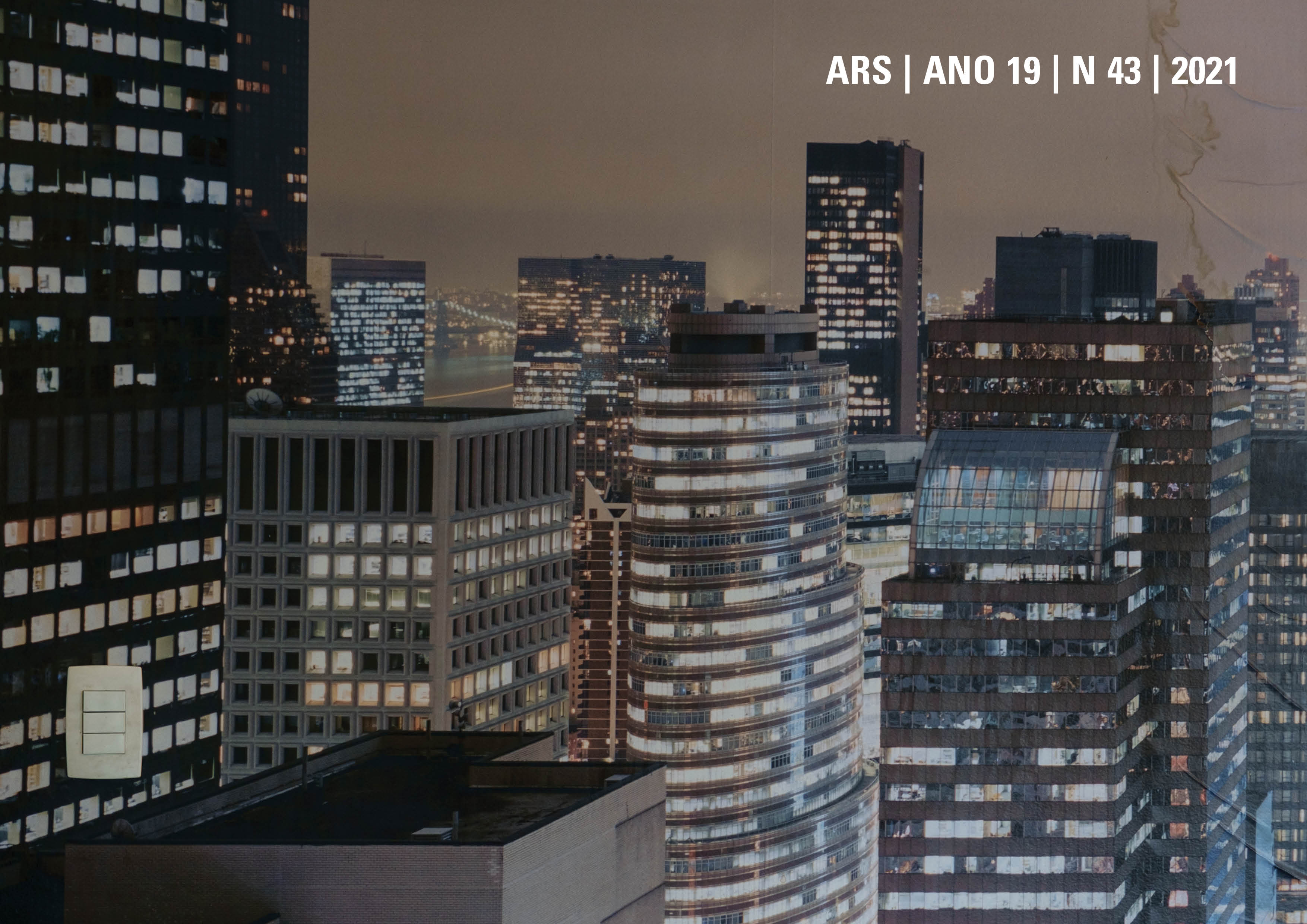William Blake contra os "moinhos satânicos" da racionalidade moderna
DOI:
https://doi.org/10.11606/issn.2178-0447.ars.2021.178423Palavras-chave:
William Blake, Início da modernidade, RacionalidadeResumo
O presente artigo examina a cerrada crítica feita por William Blake ao racionalismo, que havia se expandido e consolidado, no final do século XVIII, nas nações europeias mais poderosas e busca compreender a imaginação singular que anima sua obra, suas dimensões místicas e obscuras e sua inclinação ao estabelecimento de um sistema próprio, que foge à visão de mundo “abstrata” associada pelo artista a notórios pensadores do início da modernidade. Ao mesmo tempo, pretende mostrar como o trabalho rompeu com paradigmas de conhecimento bem estabelecidos em seu tempo e conclui que a obra do artista deveria ser reconhecida como divisor de águas no surgimento de uma estética moderna.
Downloads
Referências
BLAKE, William. Jerusalém / trad. Saulo Alencastre. São Paulo: Hedra, 2013.
BLAKE, William. Milton / trad. Manuel Portela. São Paulo: Nova Alexandria, 2014.
BLAKE, William. Visões / trad., org., introdução e notas José Antonio Arantes. São Paulo: Iluminuras, 2020.
CRABB ROBINSON, Henry. Extracts from the Diary, Letters and Reminiscences of Henry Crabb Robinson, transcribed from the Original MSS. in Dr. Williams’s Library, 1810-1852. In SYMONS, Arthur. William Blake. New York: E.P. Dutton And Company, 1907.
DAMON, S. Foster. A Blake Dictionary: The Ideas and Symbols of William Blake. Hanover: Darthmouth College Press, 1965.
DOWNING, Lisa. George Berkeley. In Stanford Encyclopedia of Philosophy Archive (Spring 2020 Edition). Stanford: Center for the Study of Language and Information (CSLI), Stanford University, 2020. Disponível em: https://plato.stanford.edu/archives/spr2020/entries/berkeley/. Acesso em: 19 ago. 2021.
ERDMAN, David V. The Complete Poetry and Prose of William Blake: Newly Revised Edition. New York: Anchor Books, 1988.
FRYE, Northrop. Fearful Symmetry: A Study of William Blake. Princeton: Princeton University Press, 1947.
HILLMAN, David; MAUDE, Ulrika. Introduction. In HILLMAN, David; MAUDE, Ulrika (ed.). The Cambridge Companion to the Body in Literature. Cambridge: Cambridge University Press, 2015.
JARVIS, Simon. Blake’s Spiritual Body. In WILSON, Ross. The Meaning of “Life” in Romantic Poetry and Poetics. New York: Routledge, 2009.
JAY, Martin. Songs of Experience: Modern American and European Variations on a Universal Theme. Berkeley e Los Angeles: University of California Press; Londres: University of California Press, Ltd, 2005.
LESSER, Harry. Blake and Plato. Philosophy, [S.l.], v. 56, n. 216, pp. 223-230, abr. 1981. Disponível em: <https://www.jstor.org/stable/3750744>. Acesso em: 29 out. 2020.
MAKDISI, Saree. Blake and the Impossible History of the 1790s. Chicago: University of Chicago Press, 2003.
MITCHELL, W. J. T. Blake's Composite Art: A Study of the Illuminated Poetry. Princeton: Princeton University Press, 1978.
RAINE, Kathleen. Blake and Antiquity: The A. W. Mellon Lectures in the Fine Arts 1962. Princeton: Princeton University Press, 1963.
RIX, Robert W. Blake, Bacon and “The Devil’s Arse”. Blake: An Illustrated Quarterly, Chapel Hill, pp. 137-144, primavera 2004. Disponível em: http://bq.blakearchive.org/37.4.rix. Acesso em: 06 mai. 2020.
ROUSSEAU, G.S.. Science and the Discovery of the Imagination in Enlightened England. Eighteenth-Century Studies, [S.l.], v. 3, n. 1, pp. 108-135, outono 1969.
SPENCE, Joseph. Anecdotes, Observations, and Characters of Books and Men: Collected from the Conversation of Mr. Pope and Other Eminent Persons of his Time. London: J. R. Smith, 1858.
TOWNSEND, Chris. Visionary Immaterialism: Berkeleian Empriricism in Blake's Poetry. Studies in Romanticism, [S.l.], v. 58, n. 3, pp. 357-382, outono 2019.
WIGNER, Eugene. Symmetries and Reflections. Woodbridge: Ox Bow Press, 1979.
Downloads
Publicado
Edição
Seção
Licença
Copyright (c) 2021 Isabela Ferreira Loures

Este trabalho está licenciado sob uma licença Creative Commons Attribution-NonCommercial 4.0 International License.
É responsabilidade dos autores a obtenção da permissão por escrito para usar em seus artigos materiais protegidos por lei de Direitos Autorais. A revista Ars não é responsável por quebras de Direitos Autorais feitas por seus colaboradores.
Os autores mantêm os direitos autorais e concedem à revista o direito de primeira publicação, com o trabalho licenciado sob Licença Creative Commons do tipo CC-BY.
Os licenciados têm o direito de copiar, distribuir, exibir e executar a obra e fazer trabalhos derivados dela, inclusive para fins comerciais, conquanto deem os devidos créditos ao autor ou licenciador, na maneira especificada por estes.
O licenciado se compromete a oferecer os créditos apropriados, o link para acesso à licença e a informar caso qualquer alteração no material original tenha sido feita.
Conquanto respeitados os termos da licença, não é permitida ao licenciador/autor a revogação dessas condições.
Após a publicação dos artigos, os autores permanecem com os direitos autorais e de republicação do texto, sendo permitida sua publicação posterior exclusivamente em livros inéditos e coletâneas.


